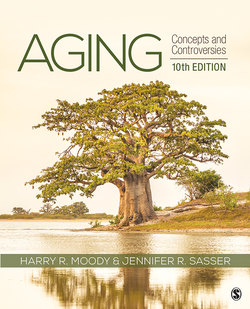Читать книгу Aging - Harry R. Moody - Страница 55
На сайте Литреса книга снята с продажи.
Gerontology and the Meaning of Age
ОглавлениеAs a branch of the human sciences, gerontology tries to depict the facts about old age as a way of understanding the meaning of aging. But the approach of gerontology sometimes looks at meaning from the outside. Perhaps a better place to begin is to ask: What do older people themselves say about what gives meaning to their lives? When a sample of participants at a senior center was asked that question, nearly 90% of respondents described their lives as meaningful (Burbank, 1992). For most of them, the meaning came from human relationships, followed by service to others, religion, and leisure activities. Another study revealed that the most damaging threat to well-being in later life is loss of life purpose and boredom, not fear of absolute destitution or poor health. Responses show that people find purpose or meaning in a variety of ways: work, leisure, friendship, lifelong learning, grandparenting, and intimate adult relationships. Respondents reported that, unless they were sick or depressed, they “didn’t feel old” (Thompson, 1993), which suggests what has been called “the ageless self” (Baars, 2012; Kaufman, 1986).
Looking at verbal responses or patterns of behavior is suggestive but may not get us any closer to understanding meaning in the last stage of life. Questionnaires about life satisfaction tell us only a limited amount about these deeper issues (Windle & Woods, 2004). Inevitably, values and philosophical assumptions reveal themselves in our discourse.
According to one widely shared view, the agenda for gerontology should be to promote better social integration of the aged (Rosow, 1967) by means of group activities, social involvement, and participatory roles of all kinds. We see that view in the popularity of productive aging, intergenerational programs, and other strategies. The ideal of an “age-integrated society” is a comprehensive enunciation of the same goal (Riley & Riley, 1994). Whether through work, leisure, or attendance at religious services, the aim of social integration is for people to stay engaged throughout life. Workers in senior centers and nursing homes often share this outlook. But if we view role losses of old age as an opportunity for self-development beyond conventional roles, then integration in group activities may no longer seem so compelling. Other values, sources of meaning, and uses of what time one has left might assume greater importance.
We might still encourage older people to maintain social connections or affiliate with groups, but the form of that engagement would be based on a strategy for individual development, not conformity to social norms or activities. An example of such individual development might be a creative arts program designed to encourage self-expression; another example might be a religious retreat designed to support individual prayer and meditation. These last kinds of pursuits seem in keeping with the potential for interiority and individuation in later life. Whether individual contemplation or social activity is the more desirable approach still remains debatable, of course, but that is precisely what is at issue in the controversy about whether old age has meaning or offers some special opportunity not readily available at other stages of life. The question is what makes it important for gerontology to look more deeply at what inspires a shared sense of meaning in life’s last stage (Cole & Gadow, 1986).
